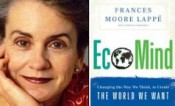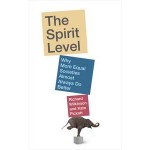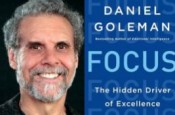Q&A: Frances Moore Lappé, Author – ECOMIND: CHANGING THE WAY WE THINK, TO CREATE THE WORLD WE WANT
Written on October 2nd, 2014 |
Aired: 9/8/13
Originally Aired: 12/30/12
Where do you think the most important changes need to take place to turn things around in terms of big issues like the economy, the environment, and social justice?
Some might say climate change is the critical global issue so it must be clean energy. Others might say nothing will make as much difference for the world’s people as educating and empowering girls and women. Closer to home, a case can be made that public financing of political campaigns would have the most impact on all such issues by making it possible for the power of the United States to become a greater force for good.
All good answers, but this week’s guest gives another answer – and its one that I share. Frances Moore Lappe, who has herself been a force for good at least since the publication of the phenomenal best-seller Diet for a Small Planet in 1971, says that the greatest impact would follow from changing our minds.
In her 18th book, ECOMIND: CHANGING THE WAY WE THINK, TO CREATE THE WORLD WE WANT, Lappé argues that much of what is wrong with the world, from eroding soil to eroding democracies, results from ways of thinking that are out of sync with human nature and nature’s rhythms. Humans are doers, she says. But our capacity for doing is undermined by seven “thought traps” that leave us mired in fear, guilt, and despair — none of which are motivators to action.
Drawing on the latest research in climate studies, anthropology, and neuroscience, she weaves her analysis together with stories of real people the world over, who, having shifted some basic thought patterns, now shift the balance of power in our world. Chapter-by-chapter, Lappé takes us from “thought trap” to “thought leap,” and with each shift, challenges become opportunities.
Free Forum Q&A – TIM DECHRISTOPHER: Civil disobedience (bidding) at public lands auction landed him 21 months in prison
Written on May 25th, 2014 |
Aired: 6/30/13
On December 19, 2008 TIM DeCHRISTOPHER disrupted a highly disputed BLM auction, effectively safeguarding thousands of acres of land. Not content to merely protest outside, Tim entered the auction hall and registered as bidder #70. He outbid industry giants on land parcels (which, starting at $2 an acre, were adjacent to national treasures like Canyonlands National Park), winning 22,000 acres of land worth $1.7 million Two months later, incoming Interior Secretary Ken Salazar invalidated the auction. Yet DeChristopher was indicted and tried on two federal felonies and spent 21 months in prison.
Released in April 2013, DeChristopher is the subject of documentary film, Bidder 70, which opened this weekend at the Music Hall in Beverly Hills and other theaters around the country. He joins me this week to tell his story. What led him to that auction? What went through his mind as he began bidding and winning? Why didn’t he take a plea deal? What was his experience in prison? What message does he have for others?
We’ll also talk about the state of the movements to deal with energy, environment, and climate change, in light of Obama’s recent speech and the eventual decision whether or not to build the KeystoneXL pipeline.
“At this point of unimaginable threats on the horizon, this is what hope looks like. In these times of a morally bankrupt government that has sold out its principles, this is what patriotism looks like. With countless lives on the line, this is what love looks like, and it will only grow…
— From Tim DeChristopher’s statement to the court at his sentencing hearing
Q&A: RICHARD WILKINSON & KATE PICKETT, Authors – The Spirit Level: Why More Equal Societies Almost Always Do Better
Written on March 2nd, 2014 |
Originally Aired: 01/31/10
RICHARD WILKINSON & KATE PICKETT authors of an important new book: The Spirit Level: Why More Equal Societies Almost Always Do Better
In the UK, the Guardian says The Spirit Level “might be the most important book of the year, and The New Statesman named it one of the top ten books of the past decade.
Based on thirty years’ research, The Spirit Level shows that unequal societies are bad for the well-off as well as the poor, when it comes to health and social problems, child well being, life expectancy, infant mortality, obesity, educational scores, drop out rates, illegal drug use, mental illness, homicide, incarceration, CO2 emissions, recycling, social mobility, innovation, and levels of trust.
The good news: If all these ills are related to one measure – income inequality, then, decreasing inequality should be the central goal of our politics because we can be confident that it works.
RICHARD WILKINSON has played a leading role in international research on inequality. He studied economic history at the London School of Economics before training in epidemiology, and is Professor Emeritus at the University of Nottingham Medical School and Honorary Professor at University College London.
KATE PICKETT is a senior lecturer at the University of York and a National Institute for Health Research Career Scientist. She studied physical anthropology at Cambridge, nutritional sciences at Cornell and epidemiology at Berkeley before spending four years as an Assistant Professor at the University of Chicago.
Free Forum Q&A- DANIEL GOLEMAN FOCUS: Hidden Driver of Excellence
Written on January 21st, 2014 |
Aired: 01/19/14
I don’t have to tell you how many messages, interruptions and distractions you are inundated with every day. Add to that the stress placed on so many of us by the many roles we play everyday – parent, partner, friend, worker, citizen. The very critical skill or quality of attention is under siege.
DANIEL GOLEMAN, the psychologist, journalist, and best-selling author who wrote the book on Emotional Intelligence, has a new book, Focus: The Hidden Driver of Excellence. In it, he delves into new, surprising findings from neuroscience labs and explains why attention is a little-noticed mental asset that makes a huge difference in how well we find our way in our personal lives, our careers, and in virtually everything we do. Like a muscle, use attention poorly and it withers; work it in the right way and it strengthens. But Goleman doesn’t only consider the personal need for attention but also the way evolution has presented humans a challenge when it comes to dealing with long term threats like climate change.
Free Forum Q&A: SARAH VanGELDER Editor-in-Chief, YES! Magazine 10 Hopeful Things That Happened in 2013
Written on January 7th, 2014 |
Aired 01/05/14
These days the media are full of lists – the best and worst of 2013 – movies, TV, music, books, etc. as well as lists of resolutions and tips for 2014. So when I got an email from SARAH VanGELDER, co-founder and editor-in-chief of YES! Magazine, in which she wrote. “I just posted my end-of-year column on the stories from 2013 that could make 2014 transformative,” , I invited her to join me today. She actually titled her article, “10 Hopeful Things That Happened in 2013 to Get You Inspired for What’s to Come,” and that sounds like a great conversation to start the new year.
We’ll look back and ahead with an eye toward catching the waves or the winds of change, building on the best of last year to make 2014 even better. Let’s commit to taking action to move us all a bit closer to a world that just might work.
